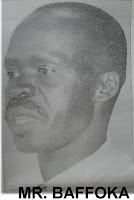The moment I set my eyes upon her loveliness, something warm swept me and held me prisoner for a fleeting microsecond. My thoughts swerved between stepping f
 orward and confessing my adoration. But once I moved over, all I could do was stare: first at her lips, before my eyes came down to linger at her firm, straight teats.
orward and confessing my adoration. But once I moved over, all I could do was stare: first at her lips, before my eyes came down to linger at her firm, straight teats.She must have been disturbed for she concocted her face into something somewhat mysterious. Whereupon I stammered about how unsettling her beauty was, and how I was ready and set to pay any price just to be friends with her.
“What?” she asked.
“Can’t we just be good friends?” I repeated.
At this moment, begin to imagine the despair and desperation of waiting and the response: “Are you born-again?”
Too stunned to answer, I held out my hand instead. A long pause, a sigh –when she finally took it looking me direct in the eyes. Those eyes again: so compelling, so searching as if to see if I had some dirty bone hidden somewhere in the most secret closet of my heart.
The world spiralled round and around but could not just put away the visible sheen of her dark, spotless skin. A distant shiver was eating up inside me, I knew not, from whence. I slowly tilted my head to appraise her one more time. It was like seeing her anew. Before me was a creature whose femininity I cannot so deligently explain. I licked my lips and thought of bacon and cookies.
She was fidgeting. Then, a wry smile slowly broke her lips and revealed a set of milk teeth and a gap at the front of the mouth along the apex of her dental arch, as she leisurely made for the door. At the exit, she hesitated and looked back, “Get lost,” she said and was gone.
Back home that evening, I burrowed my head in my pillow and thought about the girl I had met at the seminar. I was restless because I wanted to forget but could not. Suddenly, came to mind the words I had read in Lawd Today, a Richard Wright novel:
"I think of you with every breath
I takeAnd every breath becomes a sigh
Not a sign of despairBut a sigh that I care for you…"
My mind was by now saturated with the things I could do with her but I didn’t want to take that line. I switched on soft music as I called out to sweet sleep to kiss my eyes and take me away to a beautiful, unknown land.
I arose the next day feeling sunny. Not even the thought that I had been snubbed could shake my faith. After all, hadn’t she looked in my eyes? Smiled? Taken my hand?
The next days rolled by like waves. I ignored the girl that had so bowled me though I couldn’t stifle the stab to enjoy a few stolen glances at my object of interest. And on the fourth day, the urge to talk floored me. It had been a bad start, I reminded her, but surely it wouldn’t be that awful if we tried again, first with her cell phone number. Damn her! She didn’t even look at me; she left me alone and unhappy. It was the longest afternoon in which I contemplated stringing to the countryside where I was a ball among village belles.
But this girl! She was a bundle of surprises. After the seminar, she gave me a hug and shovelled something in the hip pocket of my jeans. It was a crumpled paper with a puzzle in form of ten-figure number i.e. 1286202762. This was her number –wrongly arranged. She gave me five minutes starting 9 p.m., within which to re-arrange it and send her a text message to confirm my success. Hmn!
This was the most interesting puzzle. I called about five people: four men and the wrong woman. But on my seventh attempt, I hit the mark. The object of my interest, when I got to her, laughed hard and long. A feeling of delight consumed me when she congratulated me.
By this time, I wasn’t filling “little boy blue” no more. This girl, whose eyes reminded me of candy, had a brain too. I had solved her puzzle. I never thought it would make me feel this way.
Later in the bathroom as cold water ran down my bony naked body, as I thought about our chitchat, how happy go I was feeling after Peaches (the name I had given her) agreed to go out with me, I smiled. The words I had read, again, in a Richard Wright novel, came back to mind and I sang:
“Got me doing things, things I never thought I’d do-oo-oo
Got me doing things, some are silly, some are new-oo-oo
Got me saying things, things I never said before-o-o
Got me saying things like you’re the one I adore-o-o…”
What a beautiful feeling to be in love! And with Peaches, we sure were going to “enjoy the flowers of the earth.” Together!
Published in Daily Monitor on September 24, 2006.












